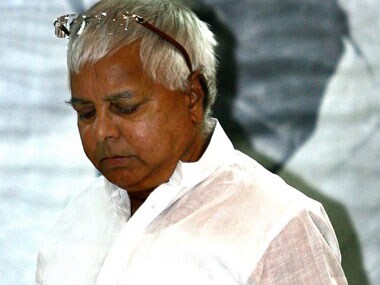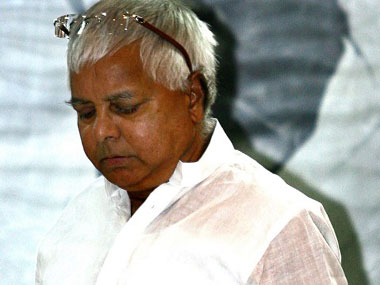The widely expected verdict in the most important of the several fodder scam cases in Bihar and Jharkand investigated by the CBI is out. I would like to scrupulously steer clear of all the political overtones that have come to be tagged on to the scam. Objectively viewed, the conviction of former Bihar chief minister Lalu Yadav is most welcome because it once again proves the fundamental strength of the Indian criminal justice system while handling high profile cases. I perceive a new phase of fearlessness in the lower judiciary that was absent, say, until a decade or two ago. This is to be highly commended, and it should act as somewhat of a deterrent on habitual lawbreakers. If this trend is sustained - I see no reason why it will not - with some guidance from the superior courts, the average citizen will be convinced that the sacred place assigned to the judiciary in the Constitution remains stable and will act as a bedrock against misdemeanour in high places. [caption id=“attachment_1142887” align=“alignleft” width=“380”]
 RJD Chief Lalu Prasad Yadav. AFP[/caption] There are several aspects of the Ranchi court’s judgment that need to be highlighted at this moment of satisfaction for many like me who had guided the CBI in the past. Here is one instance in which the much maligned organisation should be complimented for the high quality of investigation which helped to collect and place unassailable evidence that convinced the Special Court of the guilt of the 45 accused. You must remember that the case was transferred to a Jharkhand court after the united Bihar was split, and against great odds. The accused tried their best to retain the hearing of the case in Bihar, for reasons best known to them. This was thwarted by the apex court upholding of the decision to shift the trial to a court in Ranchi on grounds of jurisdiction. This possibly facilitated the witnesses, especially the crucial ones, to depose without fear or being influenced by any extraneous factors. The Supreme Court has almost institutionalised this salutary arrangement whenever it has felt - as in the Best Bakery case- that witnesses need to be protected and their deposition recorded in an ambience of peace and assurance. A second factor that has gone in favour of the prosecution is that the evidence let in was not all oral. It was ably complemented by strong documentary evidence that could hardly be controverted by the defence. In mega scams like the fodder fraud on the state treasury and where the misappropriation of public money requires the participation of several people, the fundamental duty of the investigating officer is to safeguard the critical documents which establish the criminal conspiracy. The first investigators (from the state), before the investigation was transferred to the CBI, need to be complimented for this act of sagacity. It was an entirely different matter that the state government dragged its feet for a while in handing over the documents to the CBI which came into the picture much after the first discovery of the scam by an able Deputy Commissioner of a district. This is the usual trick of many influential functionaries in government, and one could discern here shades of Coalgate we are now witness to. Lalu’s sentencing is to take place on 3 October. What will be the quantum of penalty is a matter of conjecture because the detailed judgment is yet to be delivered. The law allows suspension of sentence to facilitate an accused going on appeal where the sentence is just three years or less. This is an infirmity that permits many convicts to get away lightly in a system where appeals take enormous time to surface in a High Court. A sentence not carried out promptly is as good as no punishment, given our judicial burden and delays. I do not foresee any amendment to the Cr.PC, as our jurisprudence, borrowed from the English, places high value on the need to avoid miscarriage of justice. The Lalu judgment comes at the right time when our image abroad is at its lowest. The many scams that have tumbled out of the cupboards of both the Centre and States are of a frightening proportion. We can showcase the punishment meted out to Chautala and Lalu, besides several other politicians, as evidence that you cannot play with the criminal justice system any longer. The message to senior civil servants is no less powerful. The fodder scam was facilitated by a pliable civil service, and I know several IAS officers were also convicted in the past in the allied series of cases. It is again a time for their serious introspection. There is nothing to lose for being upright and by refusing to be intimidated by a dishonest minister, except for some perks of office. This is of course unless a civil servant himself wants a share of the loot! The writer is a former CBI director.
RJD Chief Lalu Prasad Yadav. AFP[/caption] There are several aspects of the Ranchi court’s judgment that need to be highlighted at this moment of satisfaction for many like me who had guided the CBI in the past. Here is one instance in which the much maligned organisation should be complimented for the high quality of investigation which helped to collect and place unassailable evidence that convinced the Special Court of the guilt of the 45 accused. You must remember that the case was transferred to a Jharkhand court after the united Bihar was split, and against great odds. The accused tried their best to retain the hearing of the case in Bihar, for reasons best known to them. This was thwarted by the apex court upholding of the decision to shift the trial to a court in Ranchi on grounds of jurisdiction. This possibly facilitated the witnesses, especially the crucial ones, to depose without fear or being influenced by any extraneous factors. The Supreme Court has almost institutionalised this salutary arrangement whenever it has felt - as in the Best Bakery case- that witnesses need to be protected and their deposition recorded in an ambience of peace and assurance. A second factor that has gone in favour of the prosecution is that the evidence let in was not all oral. It was ably complemented by strong documentary evidence that could hardly be controverted by the defence. In mega scams like the fodder fraud on the state treasury and where the misappropriation of public money requires the participation of several people, the fundamental duty of the investigating officer is to safeguard the critical documents which establish the criminal conspiracy. The first investigators (from the state), before the investigation was transferred to the CBI, need to be complimented for this act of sagacity. It was an entirely different matter that the state government dragged its feet for a while in handing over the documents to the CBI which came into the picture much after the first discovery of the scam by an able Deputy Commissioner of a district. This is the usual trick of many influential functionaries in government, and one could discern here shades of Coalgate we are now witness to. Lalu’s sentencing is to take place on 3 October. What will be the quantum of penalty is a matter of conjecture because the detailed judgment is yet to be delivered. The law allows suspension of sentence to facilitate an accused going on appeal where the sentence is just three years or less. This is an infirmity that permits many convicts to get away lightly in a system where appeals take enormous time to surface in a High Court. A sentence not carried out promptly is as good as no punishment, given our judicial burden and delays. I do not foresee any amendment to the Cr.PC, as our jurisprudence, borrowed from the English, places high value on the need to avoid miscarriage of justice. The Lalu judgment comes at the right time when our image abroad is at its lowest. The many scams that have tumbled out of the cupboards of both the Centre and States are of a frightening proportion. We can showcase the punishment meted out to Chautala and Lalu, besides several other politicians, as evidence that you cannot play with the criminal justice system any longer. The message to senior civil servants is no less powerful. The fodder scam was facilitated by a pliable civil service, and I know several IAS officers were also convicted in the past in the allied series of cases. It is again a time for their serious introspection. There is nothing to lose for being upright and by refusing to be intimidated by a dishonest minister, except for some perks of office. This is of course unless a civil servant himself wants a share of the loot! The writer is a former CBI director.
RK Raghavan is a former director of Central Bureau of Investigation and a former joint director of the Intelligence Bureau, New Delhi
)